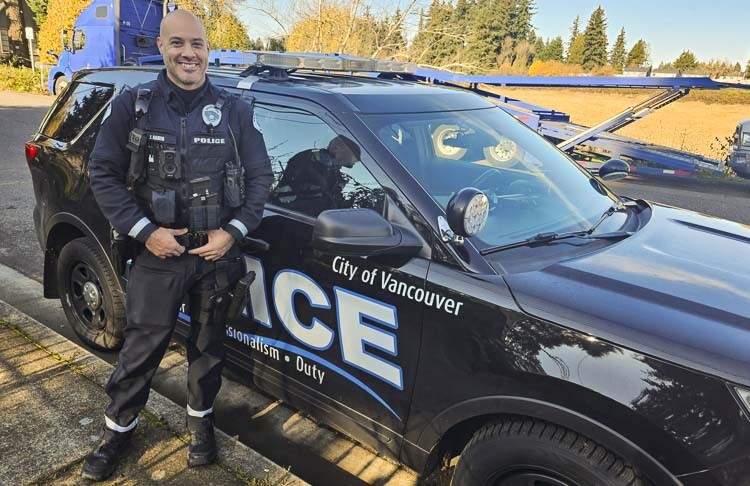
The weather is changing, and it there is less daylight hours, with brings more challenges to driving in the region
Paul Valencia
ClarkCountyToday.com
The clocks changed. The weather changed.
Driving habits should change, too.
“The sun is going down quicker. We’re getting more hours of darkness. The rain has kicked in, too. We’re seeing more rainy days,” noted Jeff Anaya of the Vancouver Police Department. “Darkness is showing up at 4:30 in the afternoon. By the time you’re driving home, it’s almost pitch black. And we’re still seeing a lot of excessive speed.”

The word is out: Slow down. Keep your distance. Stay focused.
November’s emphasis for Target Zero is speed, low visibility, and risk factors. Target Zero is a statewide campaign with the goal to have zero deaths on state highways and roads by 2030. Law enforcement officials throughout Clark County take part in the campaign, hoping to educate drivers while also enforcing the law.
Anaya said that fatalities on the roadways are down just a bit from last year, but last year was one of the worst in recent history. It is frustrating for law enforcement and other first responders to see so many drivers traveling 15, 20, or even more miles per hour over the speed limit.
Those dangerous habits are worse now after the big changes: Daylight Savings Time to Daylight Standard Time comes about the time the rain returns and foggy conditions roll in to the region.
To law enforcement officials, it is a simple equation. Just about everything associated with operating a vehicle becomes more of a challenge in the fall and winter months.
“With more speed, you have a decrease in reaction time,” Anaya said. “When you crash, you’re going to do more damage because you’re carrying more energy, more momentum behind you. With the low visibility, with darkness coming so early, you’ll have slower reaction time. You’re going to see things later.
“And then we’ve got our wet roadways. Your stopping distance is going to increase because you’re going to slide farther,” Anaya added. “The roadway is going to be slicker. You’re not going to stop as well as you would on a dry surface.”
Among the risk factors that law enforcement officers are on the look out for is following too close. That is illegal at any time of the year, but is more dangerous in the fall and winter months — for the reasons already stated.
Anaya has seen the horrific effects of crashes.
“The on-scene stuff, it hits hard because it’s real,” Anaya said. “You’re seeing that person’s life is no longer here.”
Even more difficult for Anaya, though, is notifying a family member that a person has died. He has been on the receiving end of that notification, as well.
“I know what they’re going through,” Anaya said. “For me, that’s the hardest part.”
Target Zero, Anaya, and first responders are hoping drivers follow their advice: Slow down, keep your distance, and stay focused during challenging driving situations.
Also read:
- Court rules against Save Vancouver Streets A judge has ruled against Save Vancouver Streets in its legal effort to place a street-use initiative on the ballot. The group is considering whether to appeal.
- July Sparkles at RedDoor GalleryRedDoor Gallery in Camas kicks off July with a vibrant artist reception on July 11, plus special events including Hot Art & Cool Prices, an ice cream social, and a community mural project.
- Battle Ground HealthCare appoints new executive directorNancy Strebe will take over as executive director of Battle Ground HealthCare on July 28. She brings leadership experience and a commitment to healthcare access for underserved residents.
- Deceased person found in Lake River near Ridgefield MarinaA man was found deceased in Lake River near the Ridgefield Marina on July 4. No signs of foul play were observed. A nearby sailboat, believed to be linked to the man, is also under investigation.
- County seeks nominations for local businesses, individuals for Disability Employment Awareness AwardsClark County is seeking nominations for awards honoring inclusive employment efforts. Winners will be recognized Oct. 8 at Clark College during a public event.
- WA watches CA as fed Title IX deadline looms; SCOTUS to hear trans athlete casesWashington state officials are monitoring California’s response to a federal Title IX deadline as tensions rise over transgender athletes in girls’ sports. Superintendent Chris Reykdal says the state won’t comply, risking $137 million in federal funding.
- Trump signs ‘big, beautiful bill’ during White House July 4 celebrationPresident Trump signed the “big, beautiful bill” on July 4 during a White House event featuring a military flyover and Republican leaders.











